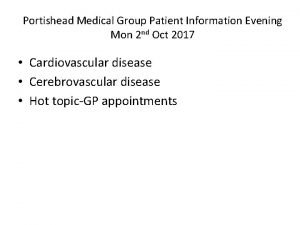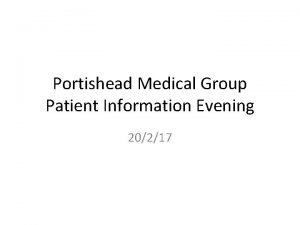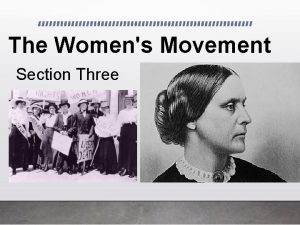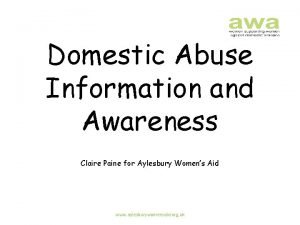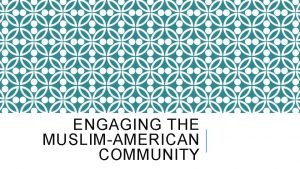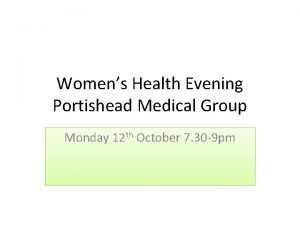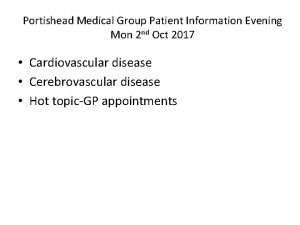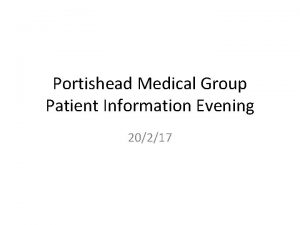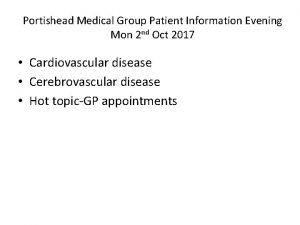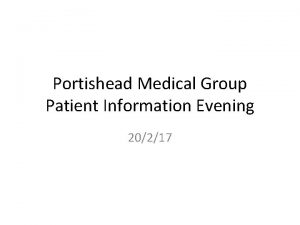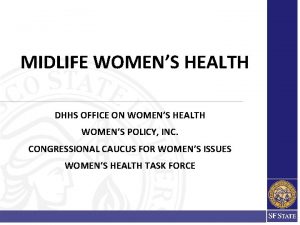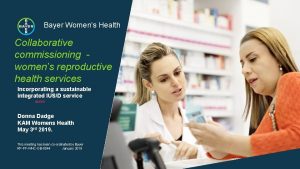Womens Health Evening Portishead Medical Group Monday 12















- Slides: 15

Women’s Health Evening Portishead Medical Group Monday 12 th October 7. 30 -9 pm

Introduction • • Mary Adams, North Somerset CCG Dr Kate Wood, PMG Dr Emily Lake, PMG Dr Gerwyn Owen, PMG

Topics to be Covered • • • Disease screening for women Hormone replacement treatment Vaginal Prolapse Osteoporosis Questions on any other concerns

Screening Programmes in the UK • What is screening? • Why do we screen?

Wilson Criteria for Screening • the condition should be an important health problem • the natural history of the condition should be understood • there should be a recognisable latent or early symptomatic stage • there should be a test that is easy to perform and interpret, acceptable, accurate, reliable, sensitive and specific • there should be an accepted treatment recognised for the disease • treatment should be more effective if started early • there should be a policy on who should be treated • diagnosis and treatment should be cost-effective • case-finding should be a continuous process

Breast Cancer Screening • Incidence rate is 125. 1/100, 000 (men 0. 9) • Eligible women, aged 50 to 70, receive an invitation letter explaining: • the programme • the benefits and risks of breast screening • Women do not always receive an invitation when they turn 50. They can expect their invitation within 3 years of their 50 th birthday. • Women cannot walk in and request breast screening unless they are over 70, when they can request screening every 3 years

Breast Cancer Screening • Early detection and treatment • Screening for high risk groups where significant family history ( first degree relatives) • Evaluation of the scheme has demonstrated more new cancers found and treated early • Debates

Cervical Cancer Screening Programme • Incidence rate in UK 8. 9/100, 000 • NHS cervical screening programme is available to women aged 25 to 64 in England • Women aged 25 to 49 receive invitations every 3 years. Women aged 50 to 64 receive invitations every 5 years. • The HPV vaccination programme started in 2008. Vaccinations will not have an impact on incidence for many years; vaccinated women should continue accepting offers of cervical screening

Cervical Cancer Screening Programme • What happens if screening is positive? • Colposcopy, biopsy • Treatment

Bowel Cancer Screening Programme • Incidence rate 37. 6/100, 000 • Stool sample • Screening every 2 years to all men and women aged 60 -74 • Positive result leads to colonoscopy usually • Treatment • If older than 74 then can request a kit by ringing 08007076060

Infectious Diseases in Pregnancy Screening • The infectious diseases in pregnancy screening (IDPS) programme currently screens for: • HIV • hepatitis B • syphilis • rubella susceptibility

Sickle Cell and Thalassaemia Screening • It screens for: • genetic carriers for sickle cell, thalassaemia and other haemoglobin disorders • sickle cell disease • thalassaemia • haemoglobin disorders • It offers screening to: • all pregnant women • fathers-to-be, where antenatal screening shows the mother is a genetic carrier • all newborn babies, as part of the newborn blood spot screening programme

Diabetic Eye Screening • This evidence shows that early identification and treatment of diabetic eye disease could reduce sight loss. The main treatment for diabetic retinopathy is laser surgery. • The eligible population for DES is all people with type 1 and type 2 diabetes aged 12 or over. • People already under the care of an ophthalmology specialist for the condition are not invited for screening. • The programme offers pregnant women with type 1 or type 2 diabetes additional tests because of the risk of developing retinopathy. • Screening gives people with diabetes and their primary diabetes care providers information about very early changes in their eyes. • Early warnings allow people to take preventative action to stop serious retinopathy developing.

Free NHS Health Checks • Men and women between 40 -74 invited to have one • Every 5 years • Family History and Lifestyle Questions • Height, weight, BMI, BP • Cholesterol • Blood glucose if at risk due to family history, raised blood pressure or obesity • Advice about smoking, exercise, alcohol and dementia awareness

• Conclusion • Any questions
 Portishead medical group
Portishead medical group Portishead medical group
Portishead medical group Portishead medical
Portishead medical Sunday evening prayers
Sunday evening prayers Umd capital region health
Umd capital region health Needs of adolescence
Needs of adolescence Womens rights
Womens rights Late night womens hour
Late night womens hour Claire paine
Claire paine Womens right
Womens right Difference between mens and womens soccer
Difference between mens and womens soccer Womens college kumbakonam
Womens college kumbakonam Womens college kumbakonam
Womens college kumbakonam Womens right
Womens right Womens shelter edmonton
Womens shelter edmonton Womens rights
Womens rights

